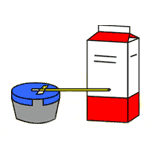|

Barometer
To measure air pressure, weather forecasters use a barometer. When the
air pressure is rising, good weather is on the way. When air pressure
is falling, the weather will get stormier.
Build Your Own Weather Tool!
Use the materials and follow the directions below.
 Materials Materials
• Empty coffee can
• Empty half-gallon jug or carton
• Index card
• Pencil and pen
• Plastic straw
• Plastic wrap
• Rubber band
• Tape
Directions
- Cover the top of the coffee can with plastic wrap.
- Use a rubber band to secure the plastic in place. Make sure the plastic
is pulled tight so that the can is airtight.
- Tape the end of the straw to the middle of the plastic wrap so it
lies horizontally across one side of the plastic wrap cover.
- Place the empty half-gallon jug (or carton) next to the coffee can.
Tape the index card to the jug so that the straw lines up approximately
to the middle of the card. Use a pen to mark this point on the card,
and label it with the date.
Experiment!
- Let the barometer settle for a few hours before beginning your observations.
Place the barometer inside, away from a window, since it is sensitive
to temperature as well as pressure.
- Take the barometer outside to start your observations. You'll be
tracking changes in the position of the straw, which will be affected
by changes to the plastic wrap: High pressure will make the plastic
wrap cave in, making the straw rise. Low pressure will make the plastic
wrap puff up, so the straw will fall.
- Check the location of the straw three times a day — in the morning,
at lunch, and at the end of the day. Using a pencil, mark the location
of the straw on the index card with the date and time.
- At the end of each day, determine if the average pressure reading
for the day was falling, steady, or rising.
- 5. Record this number on your Weather
Data Sheet (PDF).
View and print using Adobe Acrobat Reader® software, version 4.0
or higher. Get
Adobe Reader for free.
|


 Materials
Materials